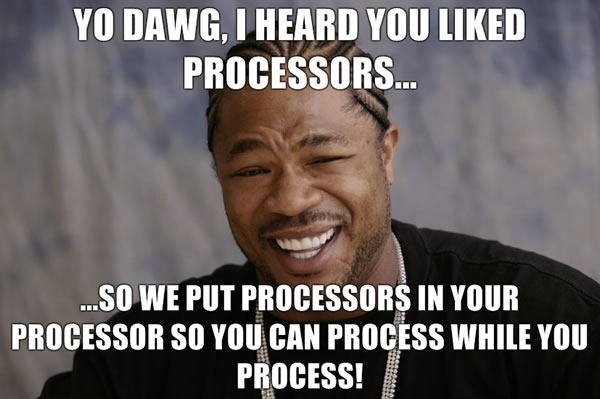 (If you don’t get the joke, here’s a little explanation.)
(If you don’t get the joke, here’s a little explanation.)
Moore’s Law isn’t dead; it just ended up taking on a new form. Named after Intel co-founder Gordon Moore, it refers to the observation that for the same amount of money, the number of transistors that can be place on a chip would double every 18 months. Moore described this trend in 1965 and expected it would continue for at least a decade; it’s held true for almost 50 years.
For a while, this doubling of transistors translated into a doubling of processor speed. We entered the 1990s with 286 processors running at about 10 MHz and left the decade with chips closing in on the 1 Ghz mark. But we didn’t get that hundredfold speed increase in the following decade; those extra transistors became multiple cores, so instead of speed, we got parallel processing engines.
To take advantage of these cores and get the speed increases that we’d grown accustomed to, it’s going to take parallel programming. It’s tricky to get right, and I have personally ruined some good programs with some bad threads, and you might have too. That’s what Parallelism Techdays (no relation to the TechDays conferences we’re putting on across Canada) are all about.
Parallelism Techdays is a FREE one-day course taught by Microsoft and Intel where you’ll learn about parallelism and threading. This is your chance to learn about threading your applications for multi-core platforms.
This course is aimed specifically at Windows C++ programmers using Visual Studio. You don’t need to be familiar with threads, but it’ll help. If you’ve got beginning to intermediate experience with threads in C++, this course is for you!
Here’s the agenda for the day:
- Thinking in Parallel
- Why go parallel?
- Types of parallelism
- Task-based parallelism vs. traditional methods
- Getting Started with Parallelism
- Approaches to converting serial code to parallel
- Approaches to creating parallel code from scratch
- Intel Parallel Advisor with test application
- Implementing Parallelism
- Choosing a parallelism environment
- Reasons we will focus on Intel TBB/Microsoft PPL in this class
- Overview of TBB/PPL
- Debugging and Correctness (Introduction)
- Overview of special bugs and parallel programs (deadlocks, data races)
- Debugging a parallel program (demos of Microsoft Visual Studio 2010)
- Correction of data races (demo of Intel Parallel Inspector)
- General guidelines for parallel processing
- Tuning
- Understanding parallel performance
- Performance tuning process
- Demos: Intel Parallel Amplifier, Microsoft Visual Studio 2010
- General strategies for solving parallel performance issues
The course starts at 9:00am and concludes at 4:00pm, with 6 hours of instructional time, plus breaks and lunch. Register now – the Montreal event is happening soon!
This article also appears in Canadian Developer Connection.
